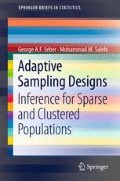Abstract
This chapter summarizes some foundational theory for adaptive sampling methods. The Rao-Blackwell theorem can be applied to unbiased estimators to provide more efficient estimators. Closed form expressions for these and related estimators are discussed. The theory is also applied to selecting networks without replacement, and the question of ignoring information from labels is considered.
Access this chapter
Tax calculation will be finalised at checkout
Purchases are for personal use only
Notes
- 1.
These concepts are more difficult for a finite population.
References
Chao C-T., A.L. Dryver, and T.C. Chiang. 2011. “Leveraging the Rao-Blackwell Theorem to Improve Ratio Estimators in Adaptive Cluster sampling.” Environmental and Ecological Statistics DOI:10.1007/s10651-010-0151-y.
Dryver, A.L., and C-T. Chao. 2007. “Ratio Estimators in Adaptive Cluster Sampling.” Environmetrics 18:607–620.
Dryver, A.L., and S.K. Thompson. 2005. “Improved Unbiased Estimators in Adaptive Cluster Sampling.” Journal of the Royal Statistical Society 67(1):157–166.
Félix-Medina, M.H. 2000. “Analytical Expressions for Rao-Blackwell Estimators in Adaptive Cluster Sampling.” Journal of Statistical Planning and Inference 84:221–236.
Low K.H., G.J. Gordon, J.M. Dolan, and P. Khosla. 2005. “Adaptive Sampling for Multi-Robot Wide Area Prospecting.” Robotics Institute, CMU, Pittsburgh, PA, Tech. Rep. CMU-RI-TR-05-51. (See http://citeseer.ist.psu.edu/viewdoc/summary?doi=10.1.1.72.4649.)
Salehi M.M. 1999. “Rao-Blackwell Versions of the Horvitz-Thompson and Hansen-Hurwitz Estimators in Adaptive Cluster Sampling.” Journal of Environmental and Ecological Statistics 6:183–195.
Salehi M.M. 2001. “Application of Adaptive Sampling in Fishery, Part 1: Adaptive Cluster Sampling and Its Strip Versions.” Iranian Journal of Fisheries Sciences 3(1):55–76.
Salehi M. M. 2003. “Comparison Between Hansen-Hurwitz and Horvitz- Estimators for Adaptive Cluster Sampling.” Journal of Environmental and Ecological Statistics 10(1):115–127.
Salehi M. M., and G.A.F. Seber. 1997. “Adaptive Cluster Sampling Design with the Networks Selected without Replacement.” Biometrika 84:209–219.
Smith, D. R., M.J. Conroy, and D.H. Brakhage. 1995. “Efficiency of Adaptive Cluster Sampling for Estimating Density of Wintering Waterfowl.” Biometrics 51:777–788.
Thompson, S.K., and G.A.F. Seber. 1996. Adaptive Sampling. New York: Wiley.
Turk, P., and J.J. Borkowski. 2005. “A Review of Adaptive Cluster Sampling: 1990–2003.” Environmental and Ecological Statistics 12:55–94.
Author information
Authors and Affiliations
Corresponding author
Rights and permissions
Copyright information
© 2012 The Author(s)
About this chapter
Cite this chapter
Seber, G.A.F., Salehi, M.M. (2012). Rao-Blackwell Modifications. In: Adaptive Sampling Designs. SpringerBriefs in Statistics. Springer, Berlin, Heidelberg. https://doi.org/10.1007/978-3-642-33657-7_3
Download citation
DOI: https://doi.org/10.1007/978-3-642-33657-7_3
Published:
Publisher Name: Springer, Berlin, Heidelberg
Print ISBN: 978-3-642-33656-0
Online ISBN: 978-3-642-33657-7
eBook Packages: Mathematics and StatisticsMathematics and Statistics (R0)

